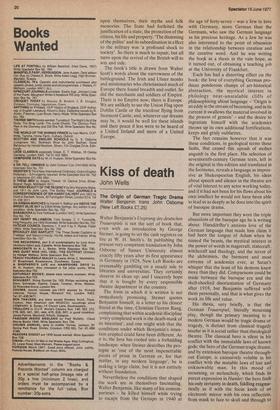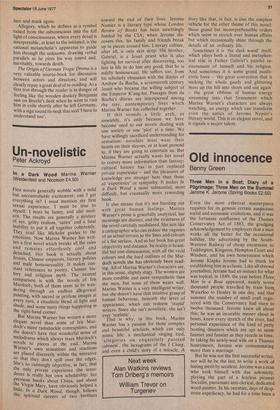Kiss of death
John Wells
The Origin of German Tragic Drama Walter Benjamin trans John Osborne (New Left Books U.25)
Walter Benjamin's Ursprung des deutschen Trauerspiels is not the sort of book that, even with an introduction by George Steiner, is going to set the cash registers on fire at W. H. Smith's. In publishing the present very competent translation by John Osborne of Sussex University almost exactly fifty years after its first appearance in Germany in 1928, New Left Books are presumably gambling on a steady sale to libraries and universities. They certainly deserve to clean up, and I sincerely hope that it is bought by every responsible theatre department in the country.
The form in which it is written is not immediately promising. Steiner quotes Benjamin himself, in a letter to his closest friend at the time, Christian Florens Rang, complaining that within academic discipline 'every completed work is the death-mask of its intention', and one might wish that the conditions under which Benjamin's intention erupted could have been different. As it is, the lava has cooled into a forbidding landscape: when Steiner describes the prologue as 'one of the most impenetrable pieces of prose in German. or, for that matter, in any modern language', he is making a large claim, but it is not entirely without foundation.
Nevertheless the conditions that shaped the work are in themselves fascinating. Walter Benjamin, like many of his contemporaries — he killed himself while trying to escape from the Gestapo in 1940 at the age of forty-seven — was a Jew in love with Germany, more German than the Germans, who saw the German language as his precious heritage. As a Jew he was also interested to the point of obsession in the relationship between creation and the creative word. And he was writing the boo,k as a thesis in the vain hope, as it turned out, of obtaining a teaching job at the University of Frankfurt.
Each has had a distorting effect on the book: the love of everything German produces ponderous clumps of art-historical abstraction, the mystical interest in philology near-unscalable cliffs of philosophising about language — 'Origin is an eddy in the stream of becoming, and in its current it swallows the material involved in the process of genesis' — and the desire to ingratiate himself with the academics throws up its own additional fortifications, keeps and grisly oubliettes.
The fact remains however that it was these conditions, in geological terms these faults, that caused this uprush of molten anguish in the first place. His selection of seventeenth-century German texts, left in the original in this edition and translated in the footnotes, reveals a language as impressive as Shakespearian English, his ideas about speech and silence in the theatre are of vital interest to any actor working today, and if it had not been for his flaws about his own intellect he would not have been able to lead us as deeply as he does into.the spirit of baroque drama.
But more important they were the triple obsessions of the baroque age he is writing about: HarsclOrffer's anxious love of the German language that made him claim it had been the tongue of Adam when he named the beasts, the mystical interest in the power of words in stagecraft, statecraft, witchcraft and theology, and the terror of the alchemists, the barmiest and most extreme of academics ever, at Satan's whisper that the least of his demons knew more than they did. Comparisons could be made between the baroque era and the shell-shocked disorientation of Germany after 1918, but Benjamin suffered with them personally, and that is what gives the work its life and value.
His thesis, very briefly, is that the German Trauerspiel, literally mourning play, though the primary meaning to a modern German would be tragic drama or tragedy, is distinct from classical tragedy insofar as it is social rather than theological theatre. The classical hero is silent in his conflict with the immutable laws of known gods: the hero of the German tragic drama, and by extension baroque theatre throughout Europe, is excessively voluble in his conflict with the mutable laws of lost 'and unknowable man. In this mood of mourning, or melancholy, which finds its purest expression in Hamlet: the hero finds his only certainty in death, fiddling enigmatically as if with the focus knob of an electronic mirror with his own reflection, from mask to face to skull and through to
face and mask again. Allegory, which he defines as a symbol raised from the subconscious into the full light of consciousness, where every detail is interpretable, at least to the initiated, is the rational melancholic's apparatus to guide him through the unknown, drawing verbal parallels as he plots his way round and, inevitably, towards death.
The Origin of German Tragic Drama is a very valuable source-book for discussion between actors and directors, and will clearly repay a great deal of re-reading. At a first trot through the reader is in danger of feeling like the wooden donkey Benjamin saw on Brecht's desk when he went to visit him in exile shortly after he left Germany, with a sign round its neck that said'! have to understand too'.



































 Previous page
Previous page